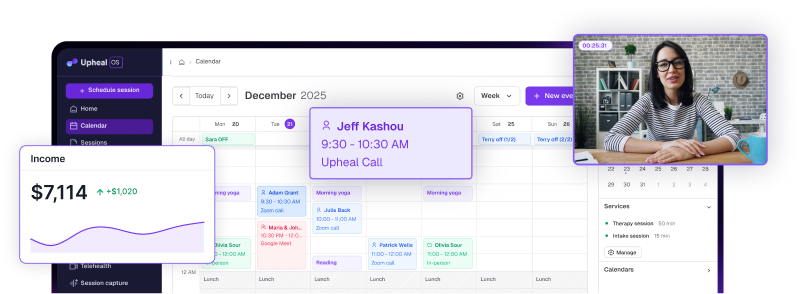A consumer’s guide to vetting AI mental health apps

AI mental health apps have exploded in popularity, and there’s seemingly something for everyone. From AI chatbots trained on cognitive behavioral therapy (CBT) interventions to AI tools that can recommend personalized meditation sessions based on challenges you’re facing.
But not all AI mental health apps are created equal.
Before you go sharing your innermost worries or asking for serious mental health support, you need to make sure you’re using an app that is both effective and safe.
And know that, while AI apps can provide light support and space for self-reflection, they’re not ready to replace human therapists.
There have even been cases where AI chatbots have caused a lot more harm than good.
To help, we’ve created a step-by-step guide to vetting AI mental health apps. We’ll walk you through the features and red flags to look out for, and how the current top apps on the market stack up against each other.
What to look for in an AI mental health app
At a glance, here’s what to know about an AI mental health app before you use it:
- Efficacy
- Safety features
- Privacy
- Cost
But before you even open the App Store, you’ll want to consider your personal goals.
Let’s dive into each of those factors in more detail.
Your goal
AI mental health apps span a broad range of products. Some chatbots simply offer light wellness advice. Others are trained by experts on therapeutic practices.
So, consider your own goals before turning to an app. Your needs will determine the best app for you, or whether a human therapist is much more suitable.
Ask yourself whether you’re looking for:
- Companionship
- Personal growth or coaching
- Advice on a specific problem, like a career change or whether to become a parent
- Day-to-day support, like managing work stress, a low mood, or relationship troubles
- Supplemental support between human therapy sessions
- Guidance through therapeutic techniques, like journaling, mood tracking, or mindfulness
- Treatment for a specific mental health condition, like depression or anxiety (either one you already have a diagnosis for or new symptoms you’re navigating)
Then, compare your goal with the apps you’re considering. Many AI apps are designed with a use case in mind — whether that’s general well-being or more targeted support.
Keep in mind that AI mental health apps can’t diagnose or treat a mental health condition. Human care is your best bet there, if possible.
Efficacy
Efficacy is up there as one of the top factors you’ll want to consider, and it’s a controversial one.
Research on whether AI chatbots are effective is still in its early stages. And many experts believe they’re not ready to provide mental health care, especially for those in crisis.
So, here’s what to look for when considering if an AI app can help you reach your goals:
- Expert development: Was the app developed with help from licensed clinicians? Is it continuously evaluated and improved? Look out for credentials, advisory boards, and partnerships with universities or mental health organizations.
- Evidence-based methods: Was the app trained on therapeutic best practices? Look for proven interventions, like cognitive behavioral therapy (CBT) or acceptance and commitment therapy (ACT).
- Research claims: Are there any studies on the app showing its effectiveness? Peer-reviewed studies are the gold standard, but even surveys or user data can give you some insights on efficacy.
- Reviews: Do humans have success stories from using the app? Look for reviews on the App Store, Reddit, Quora, and social media. Beyond users, consider reviews from trusted media outlets or mental health professionals.
Look out for red flags, like any app claiming to “cure” a mental health condition or promising relief in days.
AI mental health apps aren’t currently approved by the FDA to diagnose or treat mental health disorders. The FDA is holding an advisory panel meeting in November 2025, so regulations could be coming in the future. But for now, these apps are unregulated.
Safety Features
There are documented cases of AI chatbots giving harmful advice, sometimes leading to tragic results of users harming themselves and others.
Even if you’re not in crisis, look for safety features like:
- Crisis detection: Some chatbots can detect high-risk content (like suicidal ideation, abuse, or self-harm) and prompt users to dial 911. This prompt is sometimes built into the tool as a button, enabling one-click support when it’s needed most.
- Escalation to a human: Look for options to connect with a human, be that a therapist, crisis hotline, or emergency services. Some AI chatbots provide resources for those it detects need additional support.
- Child protection features: These could include parental controls or restricted features for younger users.
At the very least, look for a clear disclaimer stating that the app is not a substitute for human care and cannot provide mental health treatment.
And just a heads up, you’ll find many mental health AI chatbots don’t have any safety features in place. This means they’re not suitable for vulnerable populations or anyone looking for support with serious issues.
Privacy
You might be drawn to using an AI chatbot for mental health support as it feels like there’s a level of anonymity. You can discuss issues you might not want to bring up with another person — even if that person is a trained professional who doesn’t judge.
But privacy varies from app to app.
Look for:
- Clear privacy policies that state how your data is used
- Compliance with privacy and personal data laws, like HIPAA in the US or GDPR in the UK and EU
- Strong security and data encryption policies
- The option to delete personal data
- The ability to stop your data from being used to train the AI model
- No selling of data to third parties, or at least the ability to opt out of this
When it comes to privacy, red flags include a lack of transparency or policies packed with legal jargon.
But even apps with great privacy policies aren’t perfect. Just know that AI mental health apps aren’t bound by confidentiality or privilege in the same way that therapists are.
Cost
The cost of human therapy blocks many people from accessing mental health care. So a major draw of AI therapy chatbots is the lower price tag.
See if the apps you’re considering have a one-off payment or an ongoing monthly or yearly subscription. And check for any paid features or freemium models.
Top AI mental health apps
Here’s a look at some of the top AI mental health apps on the market and the features they offer.
1. Youper
Youper is an AI chatbot that’s received a lot of attention in the press for its effectiveness at reducing symptoms of mental health issues.
⭐ Main features:
- Proven to be effective at reducing symptoms of conditions like anxiety and depression
- Trained on interventions like CBT, ACT, dialectical behavioral therapy (DBT), and problem-solving therapy (PST)
- Screens users for mental health conditions and personalizes responses to individual needs
👤 Who’s it for?
- People experiencing mental health symptoms who can’t access human care
- People who want to discuss everyday worries and get exercises from a chatbot trained on therapeutic practices
⚠️ Limitations:
- Safety features aren’t clearly listed
- No monthly subscriptions to let you try it out
💰 Cost: $69.99 yearly
2. Headspace
You might have heard of Headspace as a meditation app, but it now offers an AI companion called Ebb.
⭐ Main features:
- Offers personalized meditation suggestions based on your concerns
- Provides a space to self-reflect within an app you might already use
- Designed by clinical psychologists and trained on motivational-interviewing methods
👤 Who’s it for?
- Current Headspace users
- Anyone looking for personal growth or to self-reflect on light life troubles
- Mindfulness lovers — or those interested in the practice
⚠️ Limitations:
- Designed as a wellness aid and companion, not for mental health support
- Focuses on meditation and mindfulness. Could be a pro for some, of course
💰Cost: $69.99 yearly or $12.99 monthly
3. Yuna
Yuna describes itself as an AI-powered mental health coach.
⭐ Main features:
- Ability to engage with the chatbot through voice messages
- Trained on CBT interventions
- Created with experts with PhDs in clinical psychology
- Identifies crisis language — may pause the conversation and offer additional resources and prompts to reach out to appropriate services
⚠️ Limitations:
- Support is more life coaching than therapy — that might be what you’re looking for, but good to keep in mind
- Trained in CBT practices only
👤 Who’s it for?
- People interested in personal growth, wellness tracking, and discussing light life troubles
💰 Cost: $22 monthly
4. Wysa
Wysa describes itself as an AI-powered wellbeing coach. Some organizations and insurance providers offer it for free, but you can also download the app as an individual user.
⭐ Main features:
- Trained on CBT, solution focused therapy, and mindfulness techniques
- AI-guided self-help exercises for loneliness, pain, break ups, etc.
- Backed by peer-reviewed studies
- Identifies crisis language — may prompt you to access additional resources or contact a crisis helpline
- Some plans include access to human coaches and therapists within the app
⚠️ Limitations:
- Support leans more toward life coaching and guided self-help
👤 Who’s it for?
- People with stress, low mood, or daily worries who want AI-guided self-help
- People who want a human-AI hybrid approach to mental health support
💰 Cost:
- The basic chatbot is free
- The premium version is $19.99 monthly or $74.99 yearly
- Some insurance providers, like MassMutual and Allianz, cover Wysa — check your plan to see if you can get coverage
Limitations of AI mental health apps
AI therapy apps can be ineffective, biased, and harmful, and even cause dependency issues. For many, they aren’t the best place to go for mental health support.
Here’s what we mean:
- They could be ineffective: AI tools — even those trained on therapeutic practices — haven’t undergone the years of medical training a human therapist has. And they’re not held to the same medical standards. While they come across empathetic, that’s not real, human connection you’re getting. You can’t get a diagnosis, treatment plan, or potentially true healing from an AI app.
- They could be biased: AI models can show stigma toward conditions like depression, schizophrenia, and alcohol dependence. More research is needed to show the full scale of this problem. It’s not clear whether the datasets used to train AI apps contain biases.
- They could be harmful: AI can reinforce unhelpful thoughts or give dangerous advice. Even apps with built-in safety features aren’t 100% safe. Safeguards can break down, high-risk language can get missed, and users can easily ignore prompts to seek additional support.
- They can cause dependency issues. Chatbots often mirror and reinforce delusions and encourage further use. Vulnerable people may form strong bonds and become dependent on them. In severe cases, they can experience AI psychosis, an unofficial term to describe delusions like feeling super-human or romantically involved with a chatbot.
Even if you’re looking into AI apps for light wellness support or mood tracking, it’s important to be aware of the limitations.
Final thoughts
If you can’t access care, or would rather not connect with a human, AI mental health chatbots offer an alternative to human therapy. But, as we’ve covered, not all apps are created equal.
Evaluate any app you’re considering for efficacy, safety, and privacy. As an additional safety layer, consider letting someone you trust know that you’re considering using these apps.
Plus, think about your goals before downloading. Working with a human therapist can help you get clear on what you want out of an app.
You can also discuss the use of AI with your therapist — both how you can make the most of it and how your therapist can use AI tools to improve your sessions.
Finally, AI apps might be suitable for wellness advice or getting low-stakes worries off your mind. But the general consensus among experts is that they aren’t a substitute for mental health care.
So, if you’re experiencing symptoms of a mental health condition, or facing a challenge in life, you might find the empathy, expertise, and connection you find with a human therapist can’t be matched with AI.









![Best scheduling software for therapists [2026]](https://cdn.prod.website-files.com/6328c07d72b05347cc236c49/68dd9ec24d044bac7d15aa1a_Best%20scheduling%20software%20thumbnail.avif)

